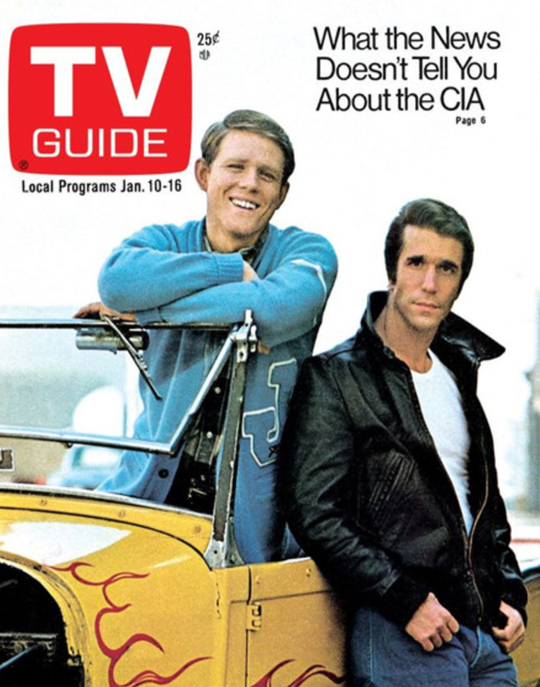
(TV Guide / ABC Photo)
Ron Howard and Henry Winkler on the cover of TV Guide in January 1976.
(The Hamilton Spectator – Saturday, March 1, 2025)
The fun fact for today, March 1, is that it’s Ron Howard’s birthday.
You may know Howard for directing some fine movies. “Apollo 13,” “A Beautiful Mind,” “Frost / Nixon,” are a few that come to mind. Way back, he was Opie from “The Andy Griffith Show.”
But for anyone still loving the ‘70s, he’s clean-cut Richie Cunningham from “Happy Days.” On Tuesday nights at 8 o’clock that show, which idealized 1950s suburban America, brought viewing teens so much joy that you’d never feel guilty for loving it way more than, say, your sister. It was fun and had a way of putting value on family and friends. It ran from 1974-84.
“Happy Days” had successful spinoffs. And another fun fact is that Robin Williams made his first TV appearance on one episode. He was the alien Mork, wanting to take Richie to his planet Ork as an example of an “average humdrum human.” Richie was juxtaposed against the uber-cool Arthur Fonzarelli, the Fonz, played by Henry Winkler in that patinated leather jacket.
Remember, in the ‘70s only a handful of TV stations existed. Screen culture was more uniform than now. More people talked about the same shows. So Richie, and especially Fonzie, had cultural influence. Interestingly-enough, Ron Howard and Henry Winkler are a study in real-life contrasts.
Winkler, humanly speaking, never should have made it far. His German Jewish parents barely escaped Berlin for New York City in 1939, just under the wire of the Second World War. Winkler’s extended family – aunts, uncles, cousins, grandparents – were all murdered in the Holocaust.
In New York he was completely hopeless in school because of dyslexia, basically ignored then. Worse, Winkler’s parents often berated him as “dummer Hund,” that’s “dumb dog.” (Note to parents. Don’t do this.) Winkler couldn’t read. He survived by improvising. Thus, eventually, the acting.
Ron Howard, meanwhile, grew up idolizing his even-keeled father, Rance, a steady mentor in young Ron’s acting life. And Ron’s mother, Jean, left such a positive mark on the family that Ron’s daughter Bryce Dallas wrote, “My grandmother’s vision and belief in what was possible for our family – as well as her joie de vivre – are what made it all possible.”
Rance and Jean Howard, actors themselves, left Oklahoma for Hollywood in 1958 when Ron was 4. Before long, their boys (Ron’s younger brother is Clint) outshone their parents’ careers. After their deaths, Ron noted his “shock of recognition,” of the rich and strange journey of his parents. “That made our journeys rich and strange too.”
Howard’s memoir, “The Boys,” and Winkler’s memoir, “Being Henry,” explore more of these two fascinating lives. Both books are on my bedside table these days, a reminder that the stories of celebrities – who are often quite embarrassed when idolized – and the stories of humdrum people, aren’t always that different.
Howard never even considered writing a memoir, but eventually took Tom Hanks’ advice: “Well, if you ever do it, write about your childhood.” The writing teachers say the same. Plug your nose and jump in. Write your memories as truthfully as you can. Writer Flannery O’Connor said anyone who’s survived childhood has enough fodder to write the rest of their lives.
No, you need not be a star to tell your story. My own father easily shared family history for hours at a time, but never recorded it, and made it hard for anyone else to try. Conversely, my father-in-law, who wasn’t a big story-teller, took time to write about his childhood and early family life. The simply-bound hardcovers given to family are now like gold.
This is it. Humdrum humans are the stuff that life is made of. Anyone’s life. From anywhere. Don’t let the memory of yours slip away. Get it down.
So Happy Birthday to Ron Howard. Thanks for sharing your memories. Appreciated as much as anything is your humility of spirit. It’s a refreshing drink during some hot days of cultural narcissism.
